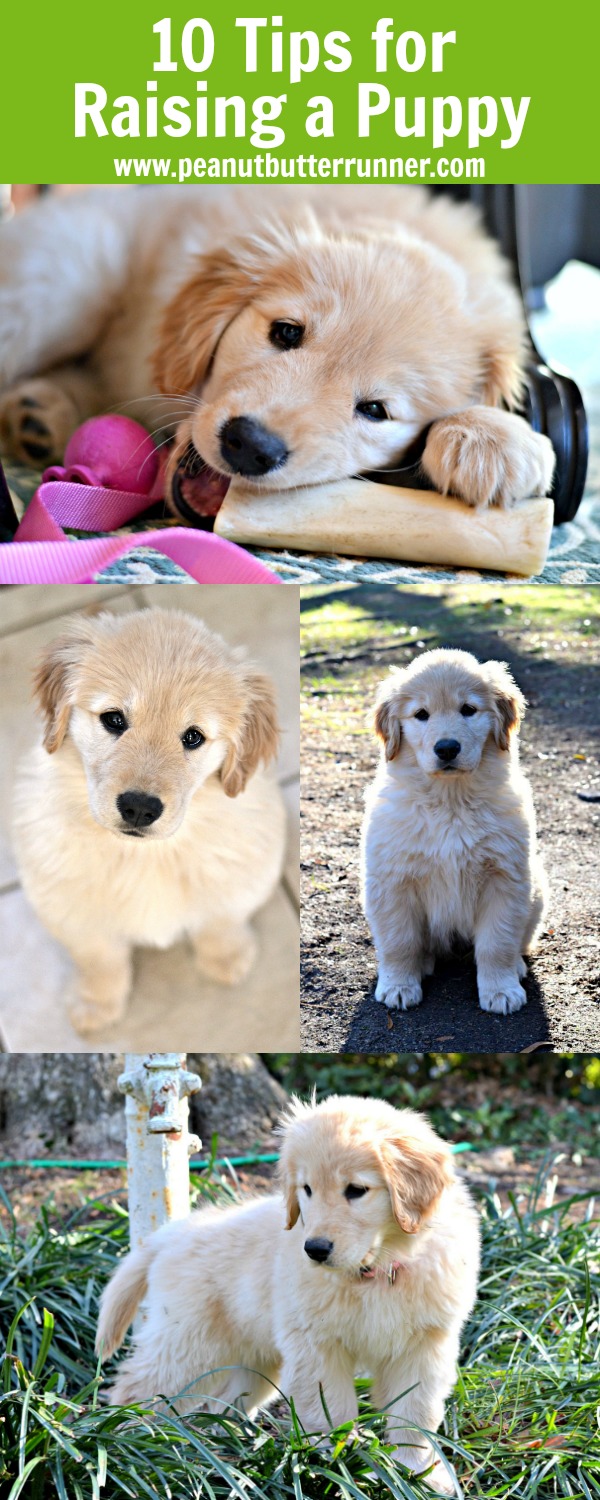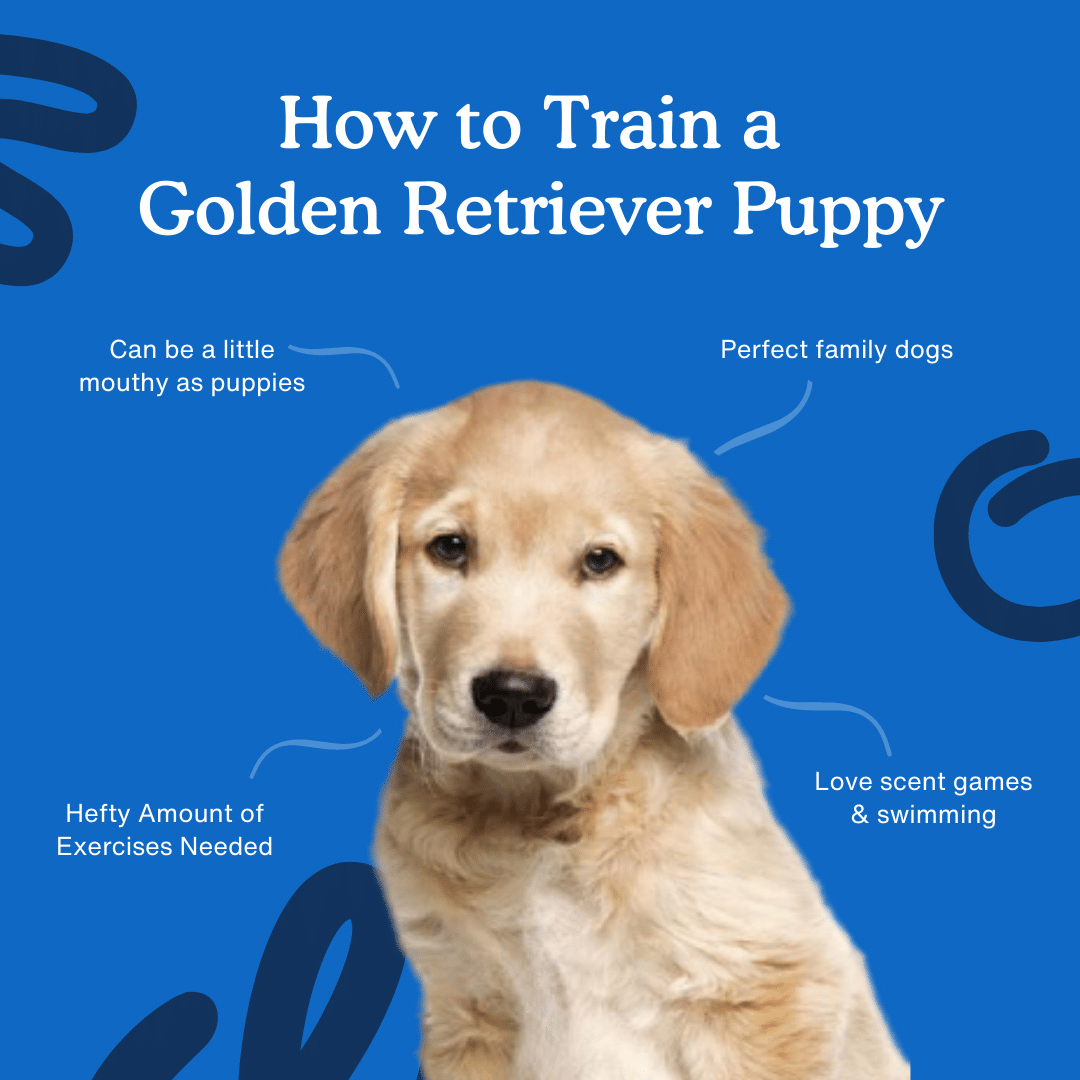To raise a Golden Retriever puppy successfully, establish schedules, routines, rules, boundaries, and expectations at home, while also providing regular exercise and mental stimulation to prevent boredom and frustration.

Credit: www.peanutbutterrunner.com
Setting Up A Schedule
When it comes to raising a Golden Retriever puppy, setting up a schedule is an essential step in ensuring their well-being and development. Establishing routines, creating rules and boundaries, and setting expectations are all key elements in providing structure and guidance for your furry friend.
Establishing Routines
Golden Retrievers thrive on consistency, and establishing a routine helps them feel secure and comfortable in their environment. Implementing a regular daily schedule can create a sense of structure and predictability for your puppy. Consider the following aspects:
- Feeding: Provide regular and consistent meals at the same times each day. This helps regulate their digestive system and prevents food-related issues.
- Nap Time: Set aside specific times for your puppy to rest and recharge. This promotes good sleep habits and prevents overtiredness.
- Playtime: Allocate dedicated periods for play and exercise. Golden Retrievers have abundant energy and need outlets to burn off that energy in a constructive and healthy way.
- Training: Incorporate training sessions into your puppy’s routine. Consistency and repetition are key to help them learn commands and behaviors effectively.
Creating Rules And Boundaries
Establishing rules and boundaries is crucial in raising a well-behaved and obedient Golden Retriever. Clear guidelines help your puppy understand what is expected of them and what behaviors are acceptable. Consider the following tips:
- House Rules: Set boundaries within your home, such as designating specific areas or rooms that are off-limits for your puppy. This helps prevent accidents or damage to furniture.
- Potty Training: Create a consistent potty training routine to teach your puppy where and when to relieve themselves. Reward them for successful potty breaks to reinforce positive behavior.
- Leash Training: Teach your puppy to walk on a leash without pulling or straining. This ensures safe and enjoyable walks for both of you.
- Behavior Correction: Use positive reinforcement techniques to reward good behavior and redirect unwanted behaviors. Consistency is key in shaping your puppy’s actions.
Setting Expectations
Setting clear expectations for your Golden Retriever puppy helps them understand their role in your family and community. It also aids in fostering a strong bond and mutual understanding between you and your furry companion. Consider these points:
- Socialization: Introduce your puppy to various people, animals, and environments to help them develop social skills and reduce anxiety in different situations.
- Basic Commands: Teach your puppy basic commands such as ‘sit,’ ‘stay,’ and ‘come.’ This not only helps in managing their behavior but also ensures their safety in potentially dangerous situations.
- Patience and Consistency: Remember that raising a puppy takes time and patience. Consistently reinforce your expectations through positive reinforcement and repetition.
By setting up a schedule and adhering to it, you provide your Golden Retriever puppy with a stable and nurturing environment. This structured routine helps them thrive and grow into well-behaved and happy adult dogs.
Socializing Your Puppy
One of the most important aspects of raising a Golden Retriever puppy is socializing them properly. Early socialization helps them develop into well-rounded and confident dogs. It is crucial to introduce them to new people and animals and expose them to different environments.
Introducing To New People And Animals
Introducing your Golden Retriever puppy to new people and animals is essential for their social development. This will help them build trust and confidence while interacting with others.
Here are some tips to follow when introducing your puppy to new people and animals:
- Start by introducing them to family members and close friends who are calm and gentle.
- Encourage positive interactions by rewarding good behavior with treats or praise.
- Gradually expose your puppy to different types of animals, such as cats or other dogs, in controlled environments.
- Supervise all interactions to ensure the safety of your puppy and others involved.
Exposing To Different Environments
Exposing your Golden Retriever puppy to different environments is crucial to help them adapt to various situations and stimuli.
Here are some ways to expose your puppy to different environments:
- Take them for regular walks in parks or busy streets to expose them to different sounds, sights, and smells.
- Visit pet-friendly establishments, such as pet stores or cafes, to expose them to different people and environments.
- Gradually introduce them to unfamiliar places by starting with less crowded areas and gradually increasing the level of exposure.
- Provide positive reinforcement and rewards to help them associate new environments with positive experiences.
Socializing your Golden Retriever puppy plays a crucial role in their overall development and helps them become well-rounded and confident dogs. By following these tips and gradually exposing them to new people, animals, and environments, you can ensure that your puppy grows up to be a friendly and adaptable companion.
Training Your Golden Retriever
Raising a Golden Retriever puppy requires time, effort, and patience. These friendly and gentle dogs are energetic and need regular exercise and mental stimulation. With proper training, they can become well-behaved and happy members of the family.
Teaching Basic Commands
To ensure a well-behaved and obedient Golden Retriever, teaching them basic commands is crucial. Basic commands include sit, stay, come, and lie down. These commands not only help in controlling your puppy’s behavior but also build a strong foundation for future training.
Start by teaching your Golden Retriever puppy the “sit” command. Use a treat to lure them into a seated position while saying the command. Once they sit, reward them with the treat and praise. Repeat this several times until they understand the command.
Next, move on to the “stay” command. Begin by having your puppy sit. Then, take a step back and say “stay.” If your puppy remains sitting, reward and praise them. Gradually increase the distance and time they need to stay before giving them the treat and praise.
The “come” command is another important one to teach your Golden Retriever. Start by having them sit and then say “come” while patting your legs. When they come towards you, reward and praise them. Practice this command in different environments to reinforce their understanding.
Positive Reinforcement
Utilizing positive reinforcement is highly effective when training your Golden Retriever. This method involves rewarding your puppy with treats, praise, and affection to reinforce desired behaviors. Positive reinforcement encourages your puppy to repeat the behavior in the future.
When training your Golden Retriever, use small, soft treats that they can easily consume. Reward them immediately after they perform the desired behavior. Along with treats, give verbal praise and petting to show your satisfaction. This positive association helps your puppy understand what behavior you want from them.
Remember to be consistent with positive reinforcement and avoid punishment-based training methods. Using fear or force can cause anxiety and hinder the training progress. Stay patient, positive, and persistent, and you’ll see great results with your Golden Retriever.
Puppy Training Tips
While training your Golden Retriever, keep these tips in mind to ensure a successful training experience:
- Start training early: Begin training your puppy as soon as you bring them home. Early training lays the foundation for future behaviors and prevents bad habits from forming.
- Be consistent: Use the same commands, gestures, and rewards each time you train. Consistency helps your puppy understand what is expected of them.
- Keep training sessions short: Golden Retriever puppies have short attention spans. Keep training sessions between 5 to 10 minutes to prevent them from getting bored or overwhelmed.
- Use positive and clear communication: Use a clear and confident tone when giving commands. Avoid yelling or using harsh tones, as this can confuse and intimidate your puppy.
- Practice patience: Training takes time and repetition. Stay patient and avoid getting frustrated. Celebrate small victories and gradually increase the difficulty of commands as your puppy progresses.
- Make it fun: Incorporate games and play into training sessions to make it enjoyable for your Golden Retriever. Use toys, treats, and positive reinforcement to create a positive training experience.
By following these training tips and techniques, you’ll be well on your way to raising a well-behaved and obedient Golden Retriever. Remember, consistency, positive reinforcement, and patience are the keys to successful training.
Proper Grooming And Care
Raising a Golden Retriever puppy involves proper grooming and care. It requires time, effort, and patience, as well as regular exercise and mental stimulation to keep them happy and healthy.
Brushing And Maintaining Coat
Brushing your Golden Retriever’s coat regularly is essential for maintaining their overall health and appearance. This breed has a beautiful and dense double coat that requires regular brushing to prevent matting and tangles. A sturdy slicker brush and grooming comb are ideal tools for this task.- Brush your Golden Retriever’s coat at least 2-3 times per week to remove loose hair and dirt.
- Start by gently brushing against the hair growth, and then brush in the direction of hair growth to remove any tangles or knots.
- Pay extra attention to the areas behind their ears, under the belly, and the tail where matting is more likely to occur.
Regular Bathing And Hygiene
Maintaining proper hygiene is crucial for your Golden Retriever’s overall health and well-being. Regular bathing helps keep their coat clean, reduce shedding, and prevent skin infections. Here are some tips for bathing your Golden Retriever:- Bathe your Golden Retriever every 6-8 weeks or as needed. Avoid washing them too frequently, as it can strip their coat of natural oils.
- Use a gentle, dog-specific shampoo that won’t irritate their skin. Make sure to rinse thoroughly to remove all shampoo residue.
- Before bathing, brush their coat to remove any loose hair or tangles.
- Trim their nails before bathing to reduce the chance of scratches.
- Use a non-slip mat or towel in the bathtub to prevent accidents.
Nail Trimming And Ear Cleaning
Proper nail trimming and ear cleaning are essential aspects of grooming your Golden Retriever. Regular maintenance of their nails and ears can help prevent discomfort and potential health issues.- Trim your Golden Retriever’s nails every 2-4 weeks to keep them at a healthy length. Use a dog nail clipper or grinder specifically designed for their size.
- Take care not to cut their nails too short, as it can cause bleeding and pain. If you’re unsure, consult a professional groomer or veterinarian.
- Clean their ears once a week using a dog ear cleaner and cotton pads. Gently wipe the visible part of their ears, taking care not to insert anything deep into the ear canal.
- Look out for any signs of redness, swelling, or discharge in their ears, which may indicate an infection. If you notice any abnormalities, consult a veterinarian.
Common Mistakes To Avoid
When raising a Golden Retriever puppy, it’s important to be aware of common mistakes that can hinder their development and overall well-being. By avoiding these pitfalls, you can ensure that your puppy grows into a happy and healthy adult. In this section, we will discuss three common mistakes to avoid: allowing too much freedom too soon, feeding too much or too little, and not providing enough exercise. Let’s dive in!
Allowing Too Much Freedom Too Soon
It’s natural to want to give your Golden Retriever puppy freedom to explore and roam around the house. However, allowing too much freedom too soon can lead to accidents, behavioral issues, and even injuries. Remember, puppies need boundaries and structure to feel safe and secure. Start by confining them to a small, puppy-proofed area of your home and gradually increase their freedom as they demonstrate good behavior. This gradual approach helps them learn what is acceptable and what is not.
Feeding Too Much Or Too Little
Feeding your Golden Retriever puppy the right amount of food is crucial for their growth and development. Overfeeding can lead to obesity and potential health problems, while underfeeding can result in malnutrition and stunted growth. Follow the guidelines provided by your veterinarian or the puppy food packaging to determine the appropriate portion size for your puppy’s age and weight. Monitor their body condition and adjust the amount as needed. Remember, treats should be given in moderation and incorporated into their daily caloric intake.
Not Providing Enough Exercise
Golden Retrievers are an active breed that requires plenty of physical exercise to stay healthy and happy. Without enough exercise, they may become restless, bored, and exhibit destructive behaviors. Aim for at least 30 minutes to an hour of exercise each day, depending on your puppy’s age and energy level. This can include walks, playtime in a fenced yard, or engaging in interactive games. Mental stimulation is equally important, so provide puzzle toys, obedience training sessions, and opportunities for socialization with other dogs and humans.
Avoiding these common mistakes will help ensure that your Golden Retriever puppy grows into a well-behaved and well-rounded adult. Remember, consistency, patience, and positive reinforcement are key when raising your furry friend. Happy parenting!

Credit: m.youtube.com

Credit: www.wikihow.com
Frequently Asked Questions On How To Raise A Golden Retriever Puppy
Are Golden Retriever Puppies Easy To Raise?
Raising Golden Retriever puppies can be rewarding but requires time, effort, and patience. They are friendly and gentle, but also energetic and need regular exercise and mental stimulation. Training them is easy but they get easily bored. Mental stimulation is important to prevent them from becoming frustrated.
What Is The Hardest Age For Golden Retriever Puppy?
The hardest age for a Golden Retriever puppy is during adolescence. They are easy to train but easily bored and require mental stimulation to avoid frustration. They also get easily excited and may not understand their own size.
How Hard Is It To Take Care Of A Golden Retriever Puppy?
Taking care of a Golden Retriever puppy requires time and effort. They are friendly and energetic, needing regular exercise and mental stimulation to keep them happy. Training is easy, but they can get bored quickly. It’s essential to provide them with mental stimulation and set boundaries to prevent them from becoming frustrated.
How Difficult Are Golden Retriever Puppies?
Raising Golden Retriever puppies can be rewarding but requires time and patience. They are easy to train but easily bored. Regular exercise and mental stimulation are necessary to prevent them from becoming frustrated. They can get easily excited and may not be aware of their own size.
Conclusion
Raising a Golden Retriever puppy can be a wonderful experience filled with love and joy. However, it is important to remember that it also requires dedication and commitment. By establishing schedules, routines, and boundaries, providing regular exercise and mental stimulation, and socializing your puppy, you can help them grow into a well-behaved and happy adult dog.
Remember, you are not just getting a pet, but a beloved family member who deserves the best care and attention. With patience and the right training methods, you can raise a Golden Retriever puppy that will bring you years of happiness and companionship.







